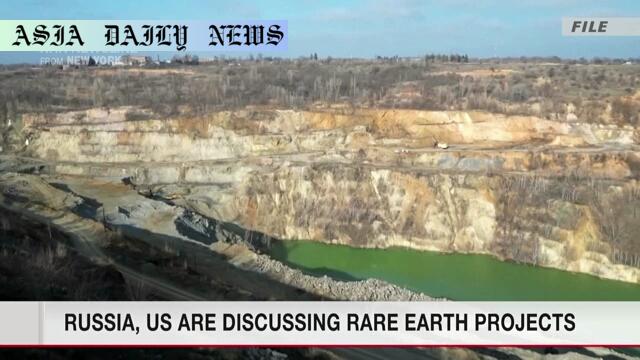Rare Earth Metals: Moscow and Washington initiate discussions on Russian rare earth resources, fostering potential collaboration.
- Discussions between Russia and the US on rare earth projects in Russia have been initiated.
- Russian Direct Investment Fund (RDIF) director emphasizes rare earths as a vital area for cooperation.
- Some American companies showcase interest, though sanctions remain a hurdle.
- Russian President Putin proposed joint development of rare earth metals in February.

Introduction: Exploring Rare Earth Metals Collaboration between Russia and the US
The development of rare earth metal deposits has emerged as a crucial consideration in geopolitical and economic discussions. Recently, conversations between Russia and the United States about exploring and possibly collaborating on rare earth projects within Russian territory have garnered attention. Kirill Dmitriev, the head of the Russian Direct Investment Fund (RDIF), pointed out the significance of mutual cooperation for this sector. His remarks were featured in an interview with the Russian publication Izvestia. These discussions reflect the growing awareness of rare earth metals’ strategic importance in technology and global development.
A Shared Interest in Rare Earth Metals Amid Geopolitical Tensions
While sanctions and political divides between the US and Russia remain a barrier, the mutual interest in accessing rare earth reserves creates a shared incentive for collaboration. These metals are crucial for the production of high-tech devices, renewable energy systems, and defense tools. In February, Russian President Vladimir Putin floated the idea of the two nations joining forces to develop Russia’s rare earth resources, particularly in the territory of the four Ukrainian regions under Russian control. Kremlin spokesperson Dmitry Peskov later confirmed initial interest from some American companies, though there are still no concrete developments due to geopolitical complications.
The Role of Rare Earth Metals in Geopolitics
Rare earth metals are a key component in various industries, ranging from electronics to defense. Their scarcity and the increasing global demand have made them strategic resources. Highlighting their importance, Dmitriev described rare earth metals as an “important area for cooperation,” emphasizing the opportunities they hold for Russia and the US, two global powers often positioned as adversaries. This potential collaboration reflects a pragmatic intersection of economic interest despite ongoing political disagreements. Crucially, it illustrates how resource diplomacy can facilitate dialogue between even the most politically opposed entities.
Challenges on the Road to Collaboration
Despite the theoretical possibilities for partnership in the rare earth metals sector, significant challenges remain. The existing US sanctions on Russia, imposed due to geopolitical conflicts, form a persistent barrier to any large-scale joint initiatives. Furthermore, the issue of trust and transparency must be addressed before either side invests heavily in joint projects. Political relations between both nations have historically been strained, and while economic incentives often pave the way for dialogue, they do not necessarily resolve underlying conflicts. For progress to be made, diplomatic efforts must accompany these discussions in the rare earth sector.
Conclusion: Unlocking Opportunities Amid Tensions
The discussions between Russia and the United States represent a crossroads of challenges and opportunities. Rare earth metals continue to grow in importance for the global economy, driving nations to search for new supplies and partnerships. Despite the difficult political landscape, this collaboration could generate mutual economic and technological gains. As talks progress, the possibility of overcoming geopolitical hurdles remains in focus, with the ultimate goal of unlocking the vast potential that lies in resource diplomacy.



Commentary
Examining the Strategic Importance of Rare Earth Metals
The burgeoning interest in rare earth metals highlights their integral role in the technological and industrial sectors. Rare earth metals are essential for producing high-performance batteries, advanced electronics, and even military hardware, making them vital resources in the globalized world. The opportunity for Russia and the United States to collaborate within this sector is not only promising but also strategically significant. As the global demand for technological advancements increases, access to rare earth resources becomes a matter of national and economic security.
Challenges in Building Partnerships Amid Political Tensions
The partnership talks between Russia and the US underscore a fascinating dynamic in international relations. Although both nations frequently find themselves on opposing ends of geopolitical debates, their mutual interest in accessing rare earth metals has initiated a dialog. However, the shadow of sanctions, unresolved political disputes, and mistrust poses significant hurdles. Breaking past these barriers won’t be easy, but the rare earth sector’s vast opportunities could contribute to evolving relationships driven by economics instead of solely politics.
Pathways to Mutual Benefit Through Resource Diplomacy
This newfound engagement between Moscow and Washington outlines the potential for economic cooperation despite external divisions. For a successful partnership, both countries need to prioritize transparent communication and outline clear methods of collaboration. At the same time, the global community must consider the environmental and ethical consequences of mining and utilizing rare earth materials. Collaborative projects optimizing these resources efficiently and sustainably could set benchmarks for future international efforts.
Final Reflections
The ongoing talks about rare earth metals represent more than just economic initiatives; they offer a glimpse of how shared interests can pave potential ways for dialogue. The path forward may be challenging, but with strategic planning, diplomacy, and mutual respect, unlocking the hidden value of rare earth metals might lead to broader conversations about international cooperation.